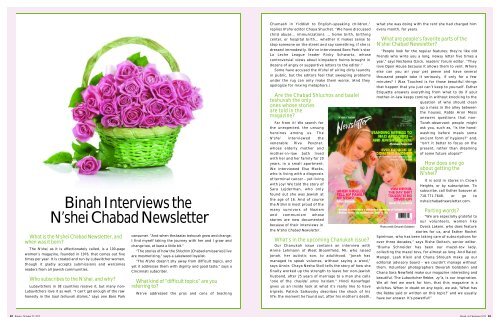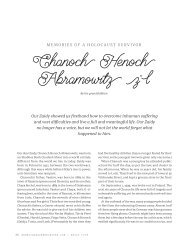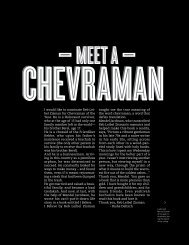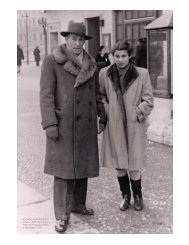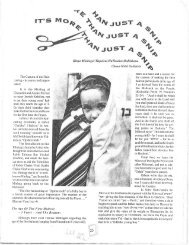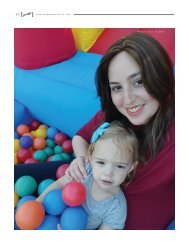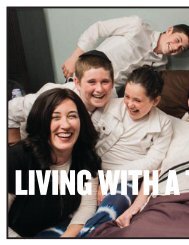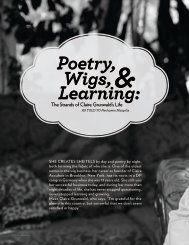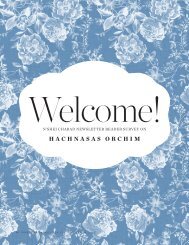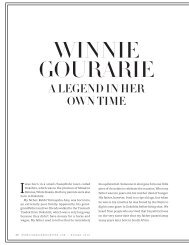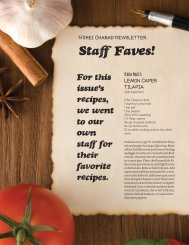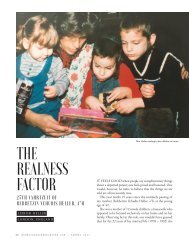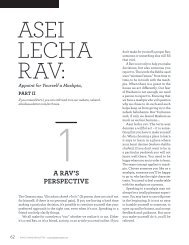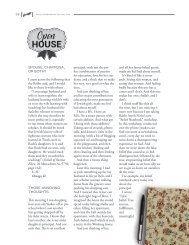Binah Interviews the N’shei Chabad Newsletter
You also want an ePaper? Increase the reach of your titles
YUMPU automatically turns print PDFs into web optimized ePapers that Google loves.
48<br />
<strong>Binah</strong> • October 22, 2012<br />
<strong>Binah</strong> <strong>Interviews</strong> <strong>the</strong><br />
<strong>N’shei</strong> <strong>Chabad</strong> <strong>Newsletter</strong> Photo<br />
What is <strong>the</strong> <strong>N’shei</strong> <strong>Chabad</strong> <strong>Newsletter</strong>, and<br />
when was it born?<br />
The <strong>N’shei</strong>, as it is affectionately called, is a 100-page<br />
women’s magazine, founded in 1976, that comes out five<br />
times per year. It is created and run by Lubavitcher women,<br />
though it gladly accepts submissions and welcomes<br />
readers from all Jewish communities.<br />
Who subscribes to <strong>the</strong> <strong>N’shei</strong>, and why?<br />
Lubavitchers in 38 countries receive it, but many non-<br />
Lubavitchers love it as well. “I can’t get enough of <strong>the</strong> raw<br />
honesty in <strong>the</strong> baal teshuvah stories,” says one Boro Park<br />
consumer. “And when <strong>the</strong> baalas teshuvah grow and change,<br />
I find myself taking <strong>the</strong> journey with her and I grow and<br />
change too, at least a little bit.”<br />
“The stories of how <strong>the</strong> Shluchim [<strong>Chabad</strong> emissaries] live<br />
are mesmerizing,” says a Lakewood loyalist.<br />
“The <strong>N’shei</strong> doesn’t shy away from difficult topics, and<br />
yet it addresses <strong>the</strong>m with dignity and good taste,” says a<br />
Cincinnati subscriber.<br />
What kind of “difficult topics” are you<br />
referring to?<br />
We’ve addressed <strong>the</strong> pros and cons of teaching<br />
Chumash in Yiddish to English-speaking children,”<br />
replies <strong>N’shei</strong> editor Chaya Shuchat. “We have discussed<br />
child abuse… immunizations … home birth, birthing<br />
center, or hospital birth… whe<strong>the</strong>r it makes sense to<br />
stop someone on <strong>the</strong> street and say something, if she is<br />
dressed immodestly. We’ve interviewed Boro Park’s star<br />
La Leche League leader Rivky Schwartz, whose<br />
controversial views about kimpatorn heims brought in<br />
dozens of angry or supportive letters to <strong>the</strong> editor.”<br />
Some have accused <strong>the</strong> <strong>N’shei</strong> of airing dirty laundry<br />
in public, but <strong>the</strong> editors feel that sweeping problems<br />
under <strong>the</strong> rug can only make <strong>the</strong>m worse. (And <strong>the</strong>y<br />
apologize for mixing metaphors.)<br />
Are <strong>the</strong> <strong>Chabad</strong> Shluchos and baalei<br />
teshuvah <strong>the</strong> only<br />
ones whose stories<br />
are told in <strong>the</strong><br />
magazine?<br />
Far from it! We search for<br />
<strong>the</strong> unexpected, <strong>the</strong> unsung<br />
heroines among us. The<br />
<strong>N’shei</strong> interviewed <strong>the</strong><br />
venerable Riva Pevzner,<br />
whose elderly mo<strong>the</strong>r and<br />
mo<strong>the</strong>r-in-law both lived<br />
with her and her family for 20<br />
years, in a small apartment.<br />
We interviewed Elsa Macks,<br />
who is living with a diagnosis<br />
of terminal cancer – yet living<br />
with joy! We told <strong>the</strong> story of<br />
Sara Lejderman, who only<br />
found out she was Jewish at<br />
<strong>the</strong> age of 16. And of course<br />
<strong>the</strong> <strong>N’shei</strong> is most proud of <strong>the</strong><br />
many survivors of Nazism<br />
and communism whose<br />
stories are now documented<br />
because of <strong>the</strong>ir interviews in<br />
<strong>the</strong> <strong>N’shei</strong> <strong>Chabad</strong> <strong>Newsletter</strong>.<br />
What’s in <strong>the</strong> upcoming Chanukah issue?<br />
Our Chanukah issue contains an interview with<br />
Annie Lehmann of West Bloomfield, MI, who raised<br />
Jonah, her autistic son, to adulthood. “Jonah has<br />
managed to speak volumes, without saying a word,”<br />
says Annie. Chaya Nesha Stoll tells <strong>the</strong> story of how she<br />
finally worked up <strong>the</strong> strength to leave her non-Jewish<br />
husband, after 25 years of marriage to a man she calls<br />
“one of <strong>the</strong> chasidei umos ha’olam.” Hindi Kanarfogel<br />
gives us an inside look at what it’s really like to have<br />
triplets. Patrick Salkovsky describes <strong>the</strong> shock of his<br />
life: <strong>the</strong> moment he found out, after his mo<strong>the</strong>r’s death,<br />
what she was doing with <strong>the</strong> rent she had charged him<br />
every month, for years.<br />
What are people’s favorite parts of <strong>the</strong><br />
<strong>N’shei</strong> <strong>Chabad</strong> <strong>Newsletter</strong>?<br />
“People look for <strong>the</strong> regular features; <strong>the</strong>y’re like old<br />
friends who write you a long, newsy letter five times a<br />
year,” says Nechama Ozick, readers’ forum editor. “They<br />
love Open House because it allows <strong>the</strong>m to vent. Where<br />
else can you air your pet peeve and have several<br />
thousand people take it seriously, if only for a few<br />
minutes? I Was Touched is for those beautiful things<br />
that happen that you just can’t keep to yourself. Es<strong>the</strong>r<br />
Etiquette answers everything from what to do if your<br />
mo<strong>the</strong>r-in-law keeps coming in without knocking to <strong>the</strong><br />
credit: Devorah Goldstein<br />
question of who should clean<br />
up a mess in <strong>the</strong> alley between<br />
<strong>the</strong> houses. Rabbi Aron Moss<br />
answers questions that non-<br />
Torah-observant people might<br />
ask you, such as, “Is <strong>the</strong> hand-<br />
washing before meals some<br />
ancient form of hygiene?” and,<br />
“Isn’t it better to focus on <strong>the</strong><br />
present, ra<strong>the</strong>r than dreaming<br />
of some future utopia?”<br />
How does one go<br />
about getting <strong>the</strong><br />
<strong>N’shei</strong>?<br />
It is sold in stores in Crown<br />
Heights, or by subscription. To<br />
subscribe, call Es<strong>the</strong>r Sosover at<br />
718.771.7648, or go to<br />
nsheichabadnewsletter.com.<br />
Parting words?<br />
“We are especially grateful to<br />
our volunteers, women like<br />
Dvora Lakein, who does feature<br />
stories for us, and Es<strong>the</strong>r Rochel<br />
Spielman, who has been taking care of subscriptions for<br />
over three decades,” says Rishe Deitsch, senior editor.<br />
“Bluma Schneider has been our mazel-tov lady,<br />
collecting <strong>the</strong> mazel tovs, for almost as long. And Raizel<br />
Mangel, Leah Klein and Chana Shloush make up our<br />
editorial advisory board – we couldn’t manage without<br />
<strong>the</strong>m. Volunteer photographers Devorah Goldstein and<br />
Chana Sara Newfield make our magazine interesting and<br />
beautiful. The Lubavitcher Rebbe, zy”a, is our inspiration.<br />
We all feel we work for him, that this magazine is a<br />
shlichus. When in doubt on any topic, we ask, ‘What has<br />
<strong>the</strong> Rebbe said or written on this topic?’ and we usually<br />
have our answer. It’s powerful!”<br />
<strong>Binah</strong> • 6 Cheshvan 5773 49


